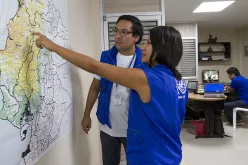After the 7.8-magnitude earthquake that hit Ecuador in April 2016, affecting the lives of around 720,000 people and with almost 30,000 people having to seek refuge in temporary camps, UNV supported the work of UN agencies with the rapid mobilization of 29 national and three international UN Volunteers who worked on emergency response, most of them in the areas directly affected by the earthquake.
Within the first three weeks after the earthquake, UNV mobilized five UN Volunteers to immediately support the work of UN agencies after the earthquake. The rest of UN Volunteers were deployed during the three months after the disaster. They all worked directly with the communities and the people who suffered the devastation of the earthquake, focusing mainly on reaching families, especially women and children who lost not only their homes but also their livelihoods, helping build their capacity and supporting strategies for economic empowerment.
Since UN Volunteers can be quickly mobilized and can easily recruit local help that is familiar with the country context and priorities, volunteers in disaster response situations provide immediate relief as well as pathways to mid- and long-term recovery measures.
Sixteen national UN Volunteers serving with the United Nations Entity for Gender Equality and the Empowerment of Women (UN Women), and four with the International Organization for Migration (IOM) helped improve women’s participation and economic empowerment by training women as construction workers, and organizing mentoring and entrepreneurship activities that allowed women and their families to improve their living conditions.

